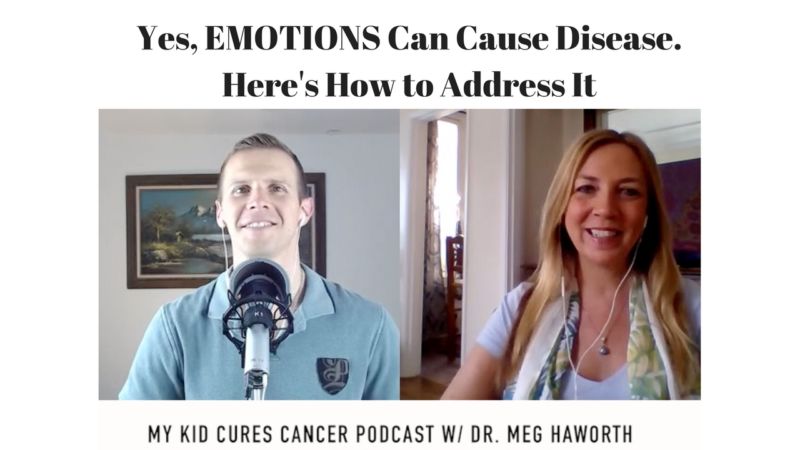
Yes, EMOTIONS Can Cause Disease. Here’s How to Address It: Dr. Meg Haworth
Podcast: Play in new window | Download
The Stern Method Podcast Episode 30: Dr. Meg Haworth
Dr. Meg Haworth explains how emotions have been proven to be a vital component in the disease process and what to do about it.
In This Episode:
- ACE study followed 77,000 people and definitely linked adverse childhood events to disease later in life.
- What parents are going emotionally during pregnancy can have a very real health impact on their children.
- Whole person integration technique for releasing these emotions both in adults and children.
- Great advice for those actively going through a traumatic experience right now.
Resources Mentioned:
Interview Highlights
Emotions and Cancer
As you’ll read below, emotions early on in life have been definitively linked to diseases later in life. But how and why does this concept matter to those of us going through cancer?
For one, if we’re being weighed down by all sorts of unaddressed negative emotions ourselves, then we’re not going to show up effectively for our kids and perform at the level they need from us.
This goes hand in hand with what we always say at MKCC about the need for parents going through cancer to take care of themselves.
This doesn’t mean to be out to lunch and not deal with the matter at hand, but it does mean that it’s absolutely vital to eat and supplement properly, exercise, and clear our heads every once in a while to be at the top of our game and make the best decisions possible for our kids.
Moreover, Meg also brought up how emotions parents (especially mothers) experience during pregnancy can have a very real impact on their children.
When our children are literally “in” our energy like that twenty four hours a day while they are forming they will actually take on those thoughts and feelings. On a more physical level they’ll also take on the cortisol and adrenaline release from a stressful experience.
How to address this ultimately comes back to the parents. Children are very sensitive to energy and we need to be ultra-cognizant of that. Not only are negative emotions not allowed around our kids, but we can also do everything we can to make a positive experience for them to reverse whatever emotions have already been built up inside them:
- Instead of being sad and concerned around your kid all the time, be positive and confident.
- Make them laugh.
- Envision out loud with your child what it looks like for them to be healed, healthy and happy.
- Positive affirmations together with your child if they’re old enough, to them if younger
Dr. Meg Haworth: Study Ties Adverse Childhood Events to Disease Later in Life
In this interview Meg repeatedly brought up the ACE (Adverse Childhood Experiences) study run by the Centers for Disease Control.
17,000 people were surveyed confidentially regarding their adverse or traumatic events in their childhood. Their responses were then tied to their health status.
The results were clear, more trauma in childhood correlated directly with a higher occurrence of disease later in life.
Meg explained that shame, blame, and unworthiness are the most common effects of physical or mental abuse as a child.
Children in these situations tend to become people pleasers and stay that way into adulthood. They’re continually more concerned with the emotions of others than themselves.
Given their preoccupation with others’ emotions this type of person is also usually stuck in flight or fight mode. Meaning large amounts of adrenaline and cortisol are being dumped into the body throughout the day.
Over time this weakens the immune system and leaves them vulnerable to disease.
Releasing Negative Emotions
Dr. Meg Haworth’s whole person integration technique is designed to address and release negative emotions that have come about from past traumas.
Meg says we need to “become friends with our emotions.” We need to realize that emotions really just want to be seen, heard, loved and understood.
This concept spelled in a little more concrete and actionable terms results in the following technique to release theses emotions:
- Ask yourself what the major emotions are you’re going through – pain, hopelessness, inadequacy, etc.
- Write the emotion down that has the greatest charge for you right now.
- Ask this emotion the following questions and write down the answers:
- Why are you here?
- How do you affect my life?
- What do you believe?
- Acknowledge the emotion’s purpose and beliefs. Then release it.
Meg explains that these negative emotions usually arise as a protection mechanism due to something that’s happened in the past.
When we can acknowledge what it is that emotion is trying to protect us from, we can then let it know that it’s no longer needed and release it.
Meg says we also need to put the responsibility to deal with these emotions squarely where it belongs – with ourselves. We’re not always responsible for the things that happen to us, but we’re always responsible for our emotions and the way we respond to them.
Dealing with a Traumatic Situation Happening Right Now
Meg Haworth also spoke on addressing an adverse event currently happening in our lives, such as a cancer diagnosis for ourselves or a loved one, as opposed to dealing with past events.
She said up front, that grieving is appropriate. If the event is life-changing enough we really need to grieve the loss of our former selves as we’ll likely never be quite the same.
“Not the same” does not need to equal “worse,” however.
After we’ve grieved Meg says we need to find the power within to make a decision. The decision to do everything we possibly can to get through it.
Start making choices to empower yourself.
When we truly decide we’re going to do whatever it takes to get through this situation and making the corresponding choices, the things we need start showing up.
The people, experience, advice, books and so on will all come into our lives when we need them to get us to the next step when we’re putting out that energy and effort.
And on that note, ultimately we need to not rely on ourselves for everything that needs to get done and seek good help.
Dr. Meg Haworth is an Author, Holistic Wellness Expert, and Celebrity Chef. She has been featured in the LA Times, NBC Nightly News, The Huffington Post, numerous podcasts & online summits, hosts a podcast series on iTunes, and taught cooking classes at Whole Foods Markets. She is the author of six books on nutrition and personal development she is an Amazon Best Selling Author. As a survivor of sex abuse, drowning, being struck by lightning, healing over a dozen illnesses including fibromyalgia, Dr. Meg knows what it is like to overcome life’s biggest challenges and has helped thousands of others do the same. She is the founder of Lightning Women; Overcoming the Wounds of Sexual, Physical & Emotional Abuse, a movement for women who suffered sex abuse and domestic violence as children and now have a chronic illness. She offers total wellness solutions from over two decades of experience in her coaching programs, Get Well Now, What Celebrities Eat, and 21 Days to Healthy Eating with 10 Steps to Overcoming The Effects of Victimization. She also heals underlying emotional patterns at the cellular level in her groundbreaking process called Whole Person Integration Technique.
Previous episodes:
How Dagmara Healed Her Daughter’s AML Leukemia With Integrative Cancer Treatments
The Link between EMFs and Cancer, What you NEED to know: Nicolas Pineault
You might also like:
The Frequency of Health – How to Tune In: Shana Ekedal
How to Unleash the Power to Heal From Within: Razi Berry

No Comments
Be the first to start a conversation